虚拟语气中的含蓄条件句常见用法总结
虚拟语气用法归纳
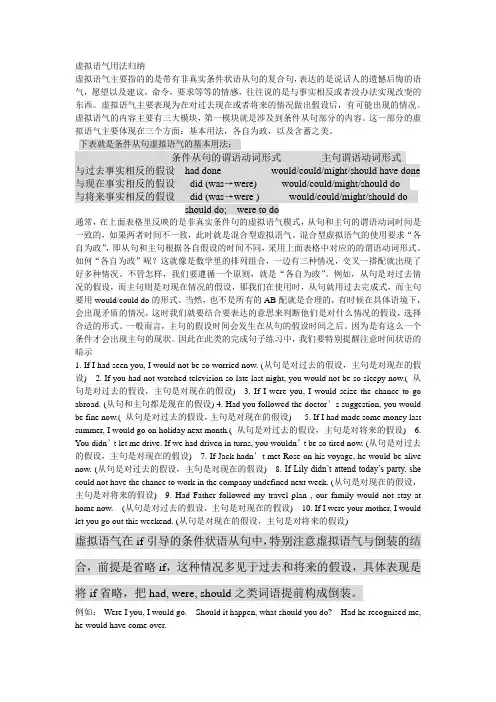
虚拟语气用法归纳虚拟语气主要指的的是带有非真实条件状语从句的复合句,表达的是说话人的遗憾后悔的语气,愿望以及建议,命令,要求等等的情感,往往说的是与事实相反或者没办法实现改变的东西。
虚拟语气主要表现为在对过去现在或者将来的情况做出假设后,有可能出现的情况。
虚拟语气的内容主要有三大模块,第一模块就是涉及到条件从句部分的内容。
这一部分的虚拟语气主要体现在三个方面:基本用法,各自为政,以及含蓄之美。
下表就是条件从句虚拟语气的基本用法:条件从句的谓语动词形式主句谓语动词形式与过去事实相反的假设had done would/could/might/should have done 与现在事实相反的假设did (was→were) would/could/might/should do与将来事实相反的假设did (was→were ) would/could/might/should doshould do; were to do通常,在上面表格里反映的是非真实条件句的虚拟语气模式,从句和主句的谓语动词时间是一致的,如果两者时间不一致,此时就是混合型虚拟语气。
混合型虚拟语气的使用要求“各自为政”,即从句和主句根据各自假设的时间不同,采用上面表格中对应的的谓语动词形式。
如何“各自为政”呢?这就像是数学里的排列组合,一边有三种情况,交叉一搭配就出现了好多种情况。
不管怎样,我们要遵循一个原则,就是“各自为政”。
例如,从句是对过去情况的假设,而主句则是对现在情况的假设,那我们在使用时,从句就用过去完成式,而主句要用would/could do的形式。
当然,也不是所有的AB配就是合理的,有时候在具体语境下,会出现矛盾的情况,这时我们就要结合要表达的意思来判断他们是对什么情况的假设,选择合适的形式。
一般而言,主句的假设时间会发生在从句的假设时间之后。
因为是有这么一个条件才会出现主句的现状。
因此在此类的完成句子练习中,我们要特别提醒注意时间状语的暗示1. If I had seen you, I would not be so worried now. (从句是对过去的假设,主句是对现在的假设)2. If you had not watched television so late last night, you would not be so sleepy now.( 从句是对过去的假设,主句是对现在的假设)3. If I were you, I would seize the chance to go abroad. (从句和主句都是现在的假设)4. Had you followed the doctor’s suggestion, you would be fine now.( 从句是对过去的假设,主句是对现在的假设)5. If I had made some money last summer, I would go on holiday next month.( 从句是对过去的假设,主句是对将来的假设)6. You didn’t let me drive. If we had driven in turns, you wouldn’t be so tired now. (从句是对过去的假设,主句是对现在的假设)7. If Jack hadn’t met Rose on his voyage, he would be alive now. (从句是对过去的假设,主句是对现在的假设)8. If Lily didn’t attend today’s party, she could not have the chance to work in the company undefined next week. (从句是对现在的假设,主句是对将来的假设)9. Had Father followed my travel plan , our family would not stay at home now. (从句是对过去的假设,主句是对现在的假设) 10. If I were your mother, I would let you go out this weekend. (从句是对现在的假设,主句是对将来的假设)虚拟语气在if引导的条件状语从句中,特别注意虚拟语气与倒装的结合,前提是省略if,这种情况多见于过去和将来的假设,具体表现是将if省略,把had, were, should之类词语提前构成倒装。
虚拟语气用法归纳
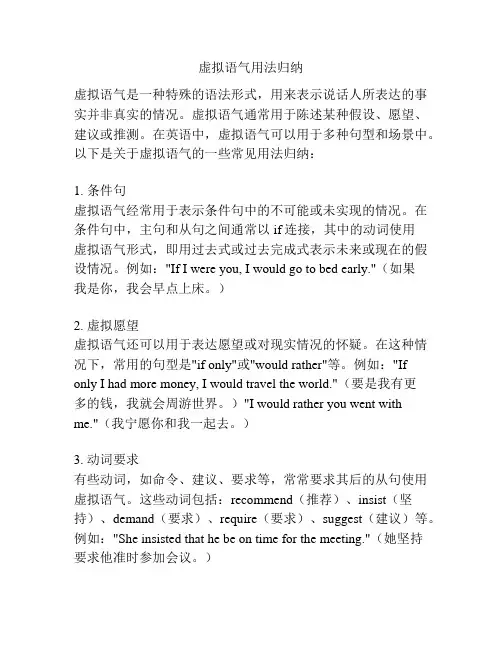
虚拟语气用法归纳虚拟语气是一种特殊的语法形式,用来表示说话人所表达的事实并非真实的情况。
虚拟语气通常用于陈述某种假设、愿望、建议或推测。
在英语中,虚拟语气可以用于多种句型和场景中。
以下是关于虚拟语气的一些常见用法归纳:1. 条件句虚拟语气经常用于表示条件句中的不可能或未实现的情况。
在条件句中,主句和从句之间通常以if连接,其中的动词使用虚拟语气形式,即用过去式或过去完成式表示未来或现在的假设情况。
例如:"If I were you, I would go to bed early."(如果我是你,我会早点上床。
)2. 虚拟愿望虚拟语气还可以用于表达愿望或对现实情况的怀疑。
在这种情况下,常用的句型是"if only"或"would rather"等。
例如:"Ifonly I had more money, I would travel the world."(要是我有更多的钱,我就会周游世界。
)"I would rather you went with me."(我宁愿你和我一起去。
)3. 动词要求有些动词,如命令、建议、要求等,常常要求其后的从句使用虚拟语气。
这些动词包括:recommend(推荐)、insist(坚持)、demand(要求)、require(要求)、suggest(建议)等。
例如:"She insisted that he be on time for the meeting."(她坚持要求他准时参加会议。
)4. 形容词和名词后接从句有时,形容词或名词后接从句时,从句中的谓语动词要使用虚拟语气。
这种情况通常表示说话人对从句所表达的内容的怀疑或不同意。
例如:"It is important that he study hard for the exam."(他认真备考这个考试很重要。
含蓄条件句的虚拟语气
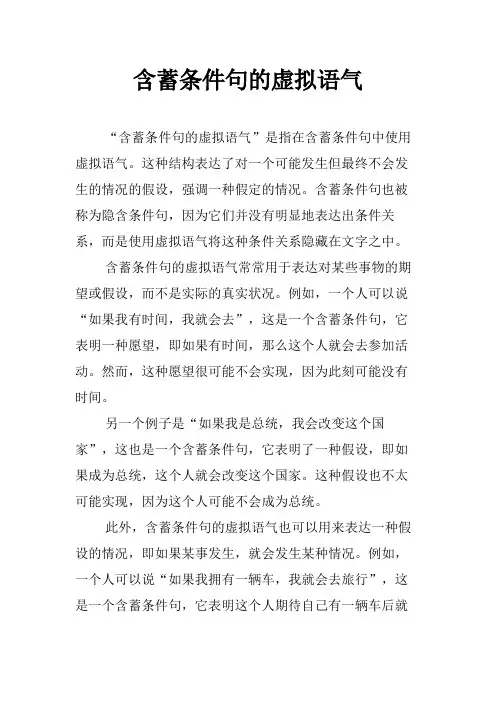
含蓄条件句的虚拟语气
“含蓄条件句的虚拟语气”是指在含蓄条件句中使用虚拟语气。
这种结构表达了对一个可能发生但最终不会发生的情况的假设,强调一种假定的情况。
含蓄条件句也被称为隐含条件句,因为它们并没有明显地表达出条件关系,而是使用虚拟语气将这种条件关系隐藏在文字之中。
含蓄条件句的虚拟语气常常用于表达对某些事物的期望或假设,而不是实际的真实状况。
例如,一个人可以说“如果我有时间,我就会去”,这是一个含蓄条件句,它表明一种愿望,即如果有时间,那么这个人就会去参加活动。
然而,这种愿望很可能不会实现,因为此刻可能没有时间。
另一个例子是“如果我是总统,我会改变这个国家”,这也是一个含蓄条件句,它表明了一种假设,即如果成为总统,这个人就会改变这个国家。
这种假设也不太可能实现,因为这个人可能不会成为总统。
此外,含蓄条件句的虚拟语气也可以用来表达一种假设的情况,即如果某事发生,就会发生某种情况。
例如,一个人可以说“如果我拥有一辆车,我就会去旅行”,这是一个含蓄条件句,它表明这个人期待自己有一辆车后就
会去旅行。
但是这种假设也不太可能实现,因为这个人可能不会拥有一辆车。
因此,可以看出,含蓄条件句的虚拟语气通常用于表达对某些不太可能发生的事情的期望或假设,以此来强调一种假定的情况。
这种结构的优点在于,它可以在不明显表达条件关系的情况下传达条件句的意思,因此可以更加得体地表达出一种假定的情况。
虚拟语气的用法及例子
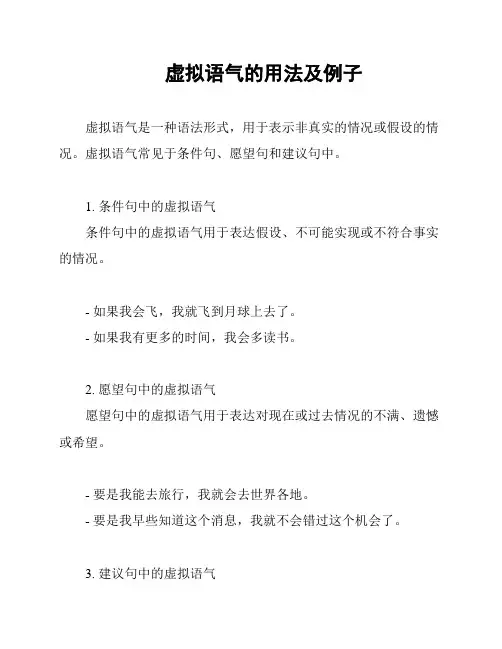
虚拟语气的用法及例子
虚拟语气是一种语法形式,用于表示非真实的情况或假设的情况。
虚拟语气常见于条件句、愿望句和建议句中。
1. 条件句中的虚拟语气
条件句中的虚拟语气用于表达假设、不可能实现或不符合事实的情况。
- 如果我会飞,我就飞到月球上去了。
- 如果我有更多的时间,我会多读书。
2. 愿望句中的虚拟语气
愿望句中的虚拟语气用于表达对现在或过去情况的不满、遗憾或希望。
- 要是我能去旅行,我就会去世界各地。
- 要是我早些知道这个消息,我就不会错过这个机会了。
3. 建议句中的虚拟语气
建议句中的虚拟语气用于表达对某种行动或情况的建议、要求或命令。
- 尽量少吃甜食,要不然你会发胖的。
- 要是你需要帮助,尽管告诉我。
虚拟语气通过使用虚拟动词和特殊的句子结构来表达。
在中文中,通常使用“如果……就……”、“要是……就……”、“如果能……就……”等句式来表示虚拟语气。
需要注意的是,虚拟语气在口语和书面语中的使用有所不同。
在口语中,虚拟语气的使用相对较少,而在正式的书面语或文学作品中,虚拟语气的使用相对较多。
希望本文对你理解和运用虚拟语气有所帮助!。
虚拟语气在条件从句中的用法
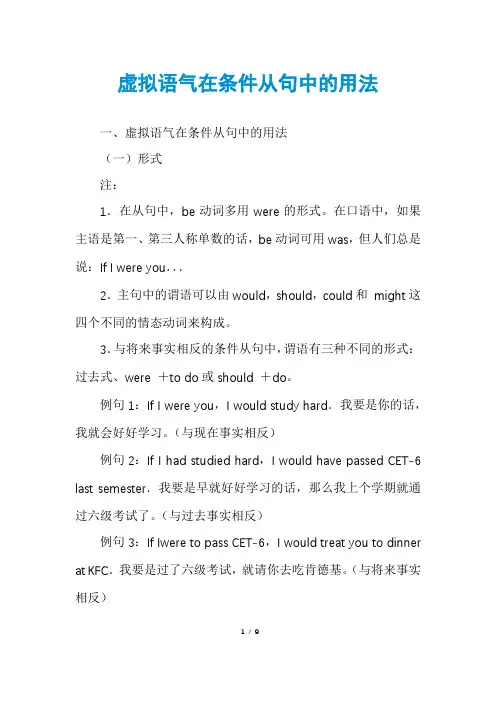
虚拟语气在条件从句中的用法一、虚拟语气在条件从句中的用法(一)形式注:1.在从句中,be动词多用were的形式。
在口语中,如果主语是第一、第三人称单数的话,be动词可用was,但人们总是说:If I were you...2.主句中的谓语可以由would,should,could和might这四个不同的情态动词来构成。
3.与将来事实相反的条件从句中,谓语有三种不同的形式:过去式、were +to do或should +do。
例句1:If I were you,I would study hard.我要是你的话,我就会好好学习。
(与现在事实相反)例句2:If I had studied hard,I would have passed CET-6 last semester.我要是早就好好学习的话,那么我上个学期就通过六级考试了。
(与过去事实相反)例句3:If Iwere to pass CET-6,I would treat you to dinner at KFC.我要是过了六级考试,就请你去吃肯德基。
(与将来事实相反)1/ 9(二)省略/倒装如果在虚拟从句中包含有一个助动词、情态动词、动词be 或have,则可把if省略,把上类动词提到主语之前,使用倒装语序。
例句4:Had it not been for the PLA,we wouldn't have been able to beat the flood.4要不是人民解放军,我们是无法战胜洪水的。
例句5:Were he here now,he would certainly help me.5他要是在这里肯定会帮我的忙。
注4:例句4中的从句部分出现了否定词not,如果把该句还原成正常语序,应该是:If it hadn't been for the PLA,we wouldn't have been able to beat the flood.但是一旦句子发生了省略,就必须把hadn't分开,否定词not还原,放在主语之后,不可写成Hadn't it been for的形式。
虚拟语气用法总结(超好_原创)

B. has broken
C. were broken
D. had been broken
2.It is (high / about) time (that) sb did/ sb should(不可省略) + do
该是某人做某事的时候了。
It is high time that you got up/should get up.
注意:
suggest:表明,暗示 陈述语气
建议
虚拟语气
Her pale face suggested that she __w_a_s_(be)ill and that she _(_s_h_o_u_l_d_)_b_e__s_e_n_t_(send) to hospital immediately.
主语+should / would/ could / might + do
1.如果我是你,我会接受他的建议。
If I were you, I would accept his advice.
2.如果明天下雨,我会待在家里。
If it rained/should rain/were to rain tomorrow, I would stay at home. 3.如果你以前好好学习, 你会通过考试的。 If you had studied hard before, you would have passed the exam.
I would rather you __h_a_d_n_’t_t_o_ld_ (not tell)me the truth.
5.用于表示 建议(advise/ suggest/ propose/recommend) 命令(order/ command) 要求(demand/require/ request/ desire) 坚持要求(insist) 等词相连的从句中需用虚拟语气: sb (should)+ do 1.I suggested that he (should) go there at once. (宾语从句)
专四语法(虚拟语气)
4) it is time (that), it is high time
(that)句型中 谓语动词用过去时, 句型中, (that) 句型中 , 谓语动词用过去时 , 或者 should+动词原形 此时的should 动词原形, should不能省 是should+动词原形,此时的should不能省 略,表示早该做而未做的事,意思是 ……了 早该…… ……了 “该……了、早该……了” It‘s already 5 o’clock now.Don‘t you think it’s about time we went home? It’s time you should do cleaning.
if, though引导的从句 5)以as if,as though引导的从句 as though (as if),意为“好像、仿佛”。as though/as if都可以引导方式状语从句或表词从 句,在连系动词之后引导表词从句,在行为动 词之后引导方式状语从句。as if/as though引导 的从句既可用陈述语气又可用虚拟语气。如果 说话者认为句子所述的是事实或是或极有可能 发生的事实时,则从句用陈述语气;如果表示 的事情发生的可能性不大或非真实的情况,则 从句用虚拟语气。动词形式和wish后面的从句 动词形式变化相同。
3)would rather + 句子(过去时) 句子(过去时) 表示“ 宁愿、 宁可” 语气比较委婉, 表示 “ 宁愿 、 宁可 ” , 语气比较委婉 , 后接过去 式。 ---I am too busy these days. I would rather all of you ______ next month for a dinner. A. come B. would C. came D. have come ---It is getting late. I’d rather you ____now. (2011.61) A. left B. leave C. are leaving D. will leave
含蓄虚拟条件句的七种表现形式
含蓄虚拟条件句的七种表现形式含蓄虚拟条件句的七种表现形式所谓含蓄虚拟条件句即指将条件从句隐藏在上下文一定的短语中的一类条件句,其主要用法及表现形式可归纳如下:1.将条件隐含在不定式短语中I would write to her, but I don’t know her address. 我会给她写信的,就是不知道她的地址。
(=If I knew her address, I would write to her. But…)To have studied harder, you would have passed the examination. 你学习更用功些,你早就考及格了。
(=If you had studied harder, you…)2.将条件隐含在分词短语中Born in better times, he would have been a scholar. 如果出生在好时代,他早就成为学者了。
(=If he had been born in better times, he would…)Failing this time, what would you do?假若这次失败,那你怎么办?(=If you failed this time, what would…)Walking alone in the dark, Mary would be terrified. 要一个人单独在黑暗中行走,玛丽会感到十分害怕。
(If Mary walked alone in the dark, she…)3.将条件隐含在介词短语中But for your help we couldn’t have succeeded in the experiment. 如果没有你的帮助,我们的实验是不会成功的。
(=If it hadn’t been for your help, we…)In different circumstances, I would have said yes. 在不同的情况下,我就会同意了。
虚拟语气的全面讲解
当条件状语 从句行为和主句表示的行为所发生的时间不一致时, 动词的形式要根据它所表示的时间来调整。
If you had worked hard, you would be very tired. If they had left home in early morning, they would arrive in half an hour. If I were you ,I wouldn‘t have missed the film last night. If you had spoken to him last time you saw him, you would know what to do now.
III. 在不同时间下,虚拟语气的三种形式,公式。 I.与现在事实相反 Were might If+主语+ 过去式动词 would 过去式助动词 , 主语+ could + V Should II.与过去事实相反 might would + have + 过去分词 If +主语+had +过去分词, 主语 + could Should
练习
1) If you ___ the doctor’s advice, you would have recognized already. A. followed B would follow C follow D had followed 2) If my lawyer ____ here last Saturday, he ___ me from going. A had been , would have prevented B had been, would prevent C were, would prevent D were, would have prevented 3) I ___ if she ____ me. A would have overslept,didn't call B would have overslept, hadn’t called C overslept, hadn't called D would overslept, didn't call 4) ---- If he ___, he___that food. ----Luckily he was sent to the hospital immediately. A was warned, would not take B had been warned, would not have taken C would be warned, had not taken D would have been warned, had not taken 5) She _____ to the party if she _____ invited. A would have gone, had been B would go , was C would have gone, was D has gone
虚拟语气分三种情况来掌握
虚拟语气分三种情况来掌握:1、虚拟条件句。
2、名词性虚拟语气。
3、虚拟语气的其他用语。
一、虚拟条件句:条件状语从句是非真实情况,在这种情况下要用虚拟语气。
1、条件从句与现在事实不一致,其句型为:If 主语+过去时,主语+should(could, would,或might)+动词原形,如:If I were you, I wouldstudyhard.If it rained, I wouldnot be here now.2、条件从句与过去事实不一致,句型为:If 主语+had+过去分词,主语+should(could, would,或might)+have+过去分词,如:If the doctor had come last night, the boy wouldhave saved.If I had not studie d hard, I wouldhave failed in the exam last term.3、条件从句与将来事实不一致,句型为:+do,主语+should(could…)+原形do过去时(与现在事实条件句一样)。
If it should rain tomorr ow, we wouldstay at home.If I were to go to the moon one day, I couldsee it with my own eyes.If you missed the film to night, you wouldfeel sorry.注意问题:1、If条件句中绝对不可出现“would”。
2、根据句中的时间状语,有时可能出现“混合虚拟”的情况,即主句可能是现在的情况,条件句也许是发生在过去的情况,但都是遵守上述句型。
3、在条件句中如果出现we re, had, should可省去if,将主语与这些词倒装,例如:Had the doctor come last night, the boy wouldhave saved.Were I to go to the moon one day, I wouldsee it with my own eyes.Should it rain tomorr ow, we wouldstay at home.二、名词性虚拟语气:在表示命令、建议要求、惊叹时的名词性从句中需用虚拟语气,基本句型:主语+(should)+动词原形,如:Mother insist ed that John go to bed at 9 o’clock.(宾语从句)We sugges ted that the meetin g should not be held.It was requir ed that the cropsshould be harves ted at once.(主语从句)The sugges tionthat he be invite d was reject ed.(同位语从句)That is theirdemand that theirwagesbe increa sed.(表语从句)注意:在这种句子中绝不出现“would”“must”“could”等。
- 1、下载文档前请自行甄别文档内容的完整性,平台不提供额外的编辑、内容补充、找答案等附加服务。
- 2、"仅部分预览"的文档,不可在线预览部分如存在完整性等问题,可反馈申请退款(可完整预览的文档不适用该条件!)。
- 3、如文档侵犯您的权益,请联系客服反馈,我们会尽快为您处理(人工客服工作时间:9:00-18:30)。
虚拟语气中的含蓄条件句常见用法先看一道高考题:
___ more attention ,the trees could have grown better .
A.Given B.To give C.Giving D .Having given
(答案是A )
句中" ...the trees could have grown better" 是一个表达虚拟语气的句子。
题中要求选择的是如何表达假设条件的形式。
如果我们把这个句子用另一种形式"If they had been given more attentio n ,the trees could have grown better ." 来表示,就不难理解了。
很多情况下,在表示假设的虚拟语气中,有时假设的条件并不以条件从句的形式表达,而是通过上下文或句中内在的逻辑关系,或用其它形式表达出来,我们称之为" 含蓄条件句" 。
含蓄条件句主要通过名词、连接词、不定式、分词、动名词短语、介词短语及分句来暗示。
这些表达形式在句中实际起着虚拟条件从句的作用。
现分述如下:一、介词短语常用来表示虚拟条件的介词有with ,without ,in ,under ,but for 等等,它们表示的虚拟条件都可以被if 从句替换。
( 1 ) without ,with
without 表示否定的条件,意为if ...not ;with 与without 意义相反,表示肯定的条件。
如:
Without air , there would be no living things .(without air = if there were no air)没有空气,便没有生物。
With her help (= If I had her help ),I would do the experiment well .假如有她帮助,我就可以把这个实验做好。
( 2 ) under
Under the leadership of a less experienced person ,the experiment would have failed .( u nder ...= If there had been the leadership of a less experienced person )假设在一个缺
少经验的人领导下进行实验,实验准会失败。
(3 ) in
I would have lost my head in that position .( in that position = if I had been in that po sition )我处在那种情况下,是会丧失理智的。
( 4 ) but for
But for their help (= If it were not for their help ) , we could not get over the difficultie s .要不是他们的帮助,我们是克服不了这些困难的。
二、连接词or ,otherwise ,but ,but that 等等
I'm really busy ,otherwise (= if I weren't so busy ),I would certainly go with you .我确
实太忙了。
不然的话,我一定和你一块去。
But that I saw it (= If I had not seen it ),I could not have believed it .要不是亲眼看见的话,我是不会相信的。
三、分词短语
United (= If they had been united ),they wouldn't have been defeated .他们要是团结起来,
就不会被打败。
Seen from a high mountain (= If it were seen from a high mountain ),the field in whi ch wheat is growing would look like a great green sea .倘若从高山上看,麦田就像一片碧绿的大海。
四、动词不定式短语
It would be only partly right to answer in this way .(= if we answered in this way )如果这样回答,只对一部分。
To hear him speak English (= If one were to hear him speak English ),one would think him an Englishman .要是听他讲起英语来,人们会认为他是一个英国人。
五、形容词或其比较级的形式
A less difficult problem would have already been solved .(= If the problem had been l
ess difficult ,it would have already been solved .)要是问题不那么难的话,它早就被解决了。
An honest man would not do such a thing .(= If he were an honest man ,he would no
t do such a thing .)诚实的人是不会做这种事的。
六、名词
An honest man would not say this .(= If the man were honest ,he wouldn't say this .)
一个诚实的人,就不会说这种话。
Who but a fool (= If one were a fool ,one )would believe his words .除了傻瓜,谁会相信他
的话!
七、"名词+and" 的结构
One step further and you would be dead .(= If you took one step further , you would be dead .)再往前走一步,你就会死。
八、独立主格结构或由with 引导的复合结构
All things considered (= If all things were considered ) , the price would be reasonable .女口果全面考虑起来,价格可
能是合理的。
九、定语从句
A nation which stopped working would be dead in a fortnight .(= If a nation stopped working ,it would be dead in a fortnight .)如果一个国家停止工作,不出半个月就会灭亡。
